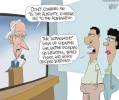Getting anxiety diagnosing an illness via Google? There’s a cure for that


![]() In the Internet age, health information is only a click (or Google search) away. This ease of access to research studies, medical websites and health articles has both negative and positive consequences, bringing answers as well as anxiety.
In the Internet age, health information is only a click (or Google search) away. This ease of access to research studies, medical websites and health articles has both negative and positive consequences, bringing answers as well as anxiety.
Searching for possible causes of physical symptoms can be disastrous, causing fear and convincing people they have a rare illness, as Silje Lier, a communication adviser for the U.S. Department of Health and Human Services noted in a recent blog post.
WebMD, for example, is mocked often for the frequency at which cancer appears in its symptom tracker tool. One cartoon shows the website embodied as a doctor telling people with a broken arm, a paper cut and a sword wound that they all could be suffering from the disease.
And yet, likely because its convenient, people continue to turn to the Internet when they’re looking for medical answers. Pew Research Center has found that 72 percent of Internet users have looked for health information online, and that 35 percent of U.S. adults have gone online “specifically to try to figure out what medical condition they or someone else might have.”
Additionally, a recent survey from the Public Religion Research Institute found that 43 percent of millennials look online for information about sexual health, making the resource only 2 percent less popular than medical professionals, Deseret News National reported.
HHS, like many health care organizations and professionals, wants to turn the Internet into a force for good for the medical community. Its new video, called “Do you suffer from WIMS (web-induced medical stress)?,” illustrates how even the simple act of reading about sitting for too many hours a day can quickly escalate into hysteria, and offers the HHS-run website www.healthfinder.gov as an antidote to ongoing confusion.
“Health information doesn’t have to be confusing or scary,” the video explains.
Healthfinder.gov collects health news, advice from doctors, tips on being healthy and recommendations for preventative care like flu shots all in one place. But it’s not the only place people can turn to for valuable health information, Lier wrote.
He said a trustworthy website should have four key characteristics: the organization sponsoring the resource should be clearly identified, the date of publication should be noted, privacy protections should be in place and there should be a number to call for more information.”If a health website doesn’t tell you these things, go somewhere else that does get you the health information you need,” Lier said.



















